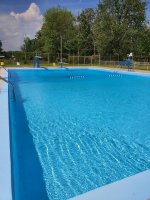So my community pool (open only to residents of my subdivision) is opening late next month and we’re trying to save as much money as possible due to having to buy a new pump (holy cr*p....I did not know how expensive those things are for a commercial pool!) so I thought about letting them know about this site and the TFP method. Is this practical at all for a commercial pool? I do not know the dimensions of the pool yet but I know it’s a lot of water (it has a high dive so the deepest part of the pool is 13 ft deep). I will find out the dimensions and how many gallons today if I can. We are still painting stuff around the pool (lifeguard chairs, diving boards, etc.) so I know I’m getting ahead of myself here. I just wanted to hear some opinions before even suggesting this and looking like a crazy person lol. I would love to hear your thoughts. Thanks in advance!
Here is a picture of the pool from last summer:

Here is a picture of the pool from last summer:

Last edited:

